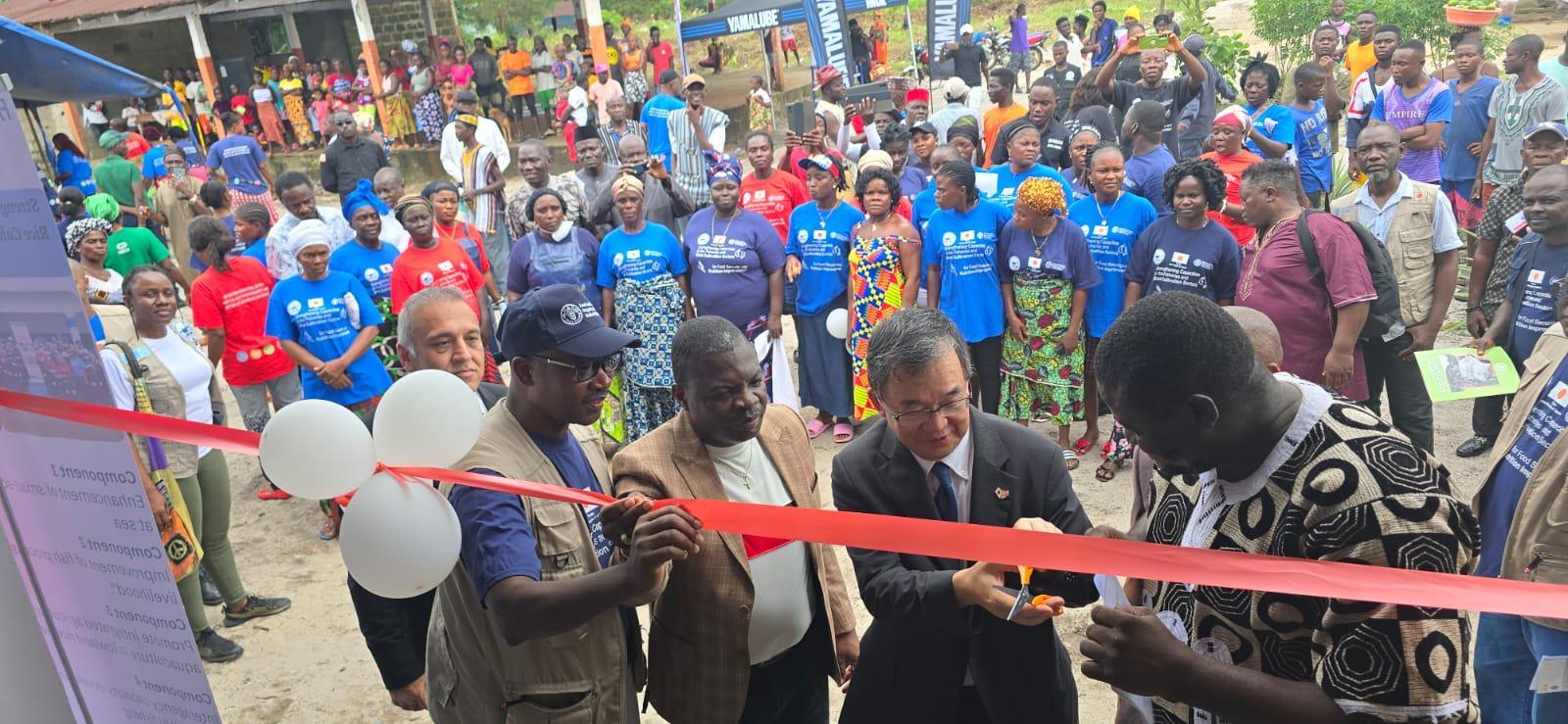Africa-Press – Liberia. Liberia’s fisheries sector took a historic step toward modernization as the Government of Japan, the Food and Agriculture Organization of the United Nations (FAO), and the National Fisheries and Aquaculture Authority (NaFAA) jointly inaugurated a state-of-the-art fish processing facility in Little Bassa, Compound #1, Grand Bassa County.
The new facility, fully equipped with modern fish processing technology, solar-powered freezers, and sea safety materials is expected to drastically cut post-harvest losses, improve food quality, and empower women fishmongers across Liberia’s nine coastal counties.
For years, Liberia’s fisheries sector has been plagued by low productivity, unsafe fishing practices, and high post-harvest losses. Fish processors, primarily women, have relied on traditional smoking techniques that produce heavy smoke, pose serious health risks, and contaminate fish with harmful chemicals.
Marine production has also been suboptimal due to a lack of equipment and training for small-scale fishers, while illegal, unreported, and unregulated (IUU) fishing continues to threaten marine resources.
The three-year project “Strengthening Capacities in Fisheries and Rice Cultivation Sectors for Food Security and Nutrition Improvement,” funded by the Government of Japan, was designed to respond to these challenges through a comprehensive approach. Its four core objectives include enhancing small-scale fisheries and sea safety improving livelihoods of fish processors, particularly women, promoting integrated rice–fish farming systems and strengthening inter-agency collaboration to combat IUU fishing
The newly launched facility features the FAO-Thiaroye Processing Technique (FTT), a proven technology introduced in over 20 countries that reduces smoke emissions, improves fuel efficiency, and delivers higher-quality, longer-lasting fish products.
FAO also trained 120 fishmongers as trainers-of-trainers to share their knowledge with over 1,800 women across Liberia’s nine coastal counties. The project distributed solar-powered freezers to ensure cold storage and reduce spoilage, while procuring 100 outboard engines, life jackets, GPS devices, and buoys to promote safety at sea.
In addition, 20 fishers from all nine coastal counties were trained in sea safety and engine maintenance — skills that will be passed on to at least 700 more fishermen nationwide.
H.E. Hiroshi Yoshimoto, Ambassador of Japan to Ghana, Liberia, and Sierra Leone, said the project is a testament to Japan’s principle of human security.
“Human security places people at the center of development, ensuring that all individuals have the freedom to live in dignity, free from fear and want,” Ambassador Yoshimoto said.
“By strengthening small-scale fisheries and rice production, the project has provided practical solutions to complex challenges and invested in human lives and community resilience.”
The new facility, fully equipped with modern fish processing technology, solar-powered freezers, and sea safety materials is expected to drastically cut post-harvest losses, improve food quality, and empower women fishmongers across Liberia’s nine coastal counties.
He encouraged local stakeholders to take ownership of the facility, sustain its benefits, and explore ways to expand its reach to other coastal communities.
FAO Country Representative Bancie Saeed praised the initiative as a model for how partnerships can deliver real change.
“This project addresses two urgent problems — unsafe, traditional fish smoking methods and the lack of safety equipment for fishers — with practical, scalable solutions,” Saeed said.
“The facility is not just a building; it is a lifeline for women fishmongers, a safeguard for consumers, and a driver of economic growth.”
He reaffirmed FAO’s commitment to supporting Liberia with technical expertise and partnerships to help achieve the Sustainable Development Goals (SDGs).
NaFAA Acting Director General, J. Cyrus Saygbe, Sr., emphasized that the project is not only about infrastructure but about improving lives.
“When the fisherman prospers, the whole village eats,” Saygbe told participants.
“This facility empowers our women, strengthens our communities, and represents progress for our nation. Liberia deeply values its partnership with Japan and FAO in building a more sustainable fisheries sector.”
For the women of Little Bassa, the project has already started to change their lives.
“Before, our fish spoiled quickly, and we lost money,” said Lisa S. Tamba, Vice President of the Little Bassa Fishmongers Association. “Now, with solar freezers and training, we can keep our fish fresh longer and sell them at a better price. We are grateful to Japan, FAO, NaFAA, and UNDP for bringing this facility to our community.”
A UNDP representative described the facility as “a symbol of what can be achieved when development partners, government, and local communities work together.”
The Little Bassa facility is one of 15 processing hubs being established across Liberia’s nine coastal counties. Together, these hubs are expected to transform fish processing, reduce food losses, and create new economic opportunities for thousands of women and coastal households.
Ambassador Yoshimoto underscored that the closing of the project is not the end of collaboration. “We will be grateful to receive updates on how this project continues to impact communities. Seeing its success encourages us to keep supporting initiatives like this.”
With modern technology, training, and equipment now in the hands of Liberia’s fishmongers, the future of the country’s fisheries sector looks stronger, safer, and more sustainable.
For More News And Analysis About Liberia Follow Africa-Press






